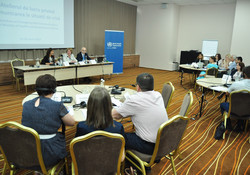Improving emergency risk communication in the Republic of Moldova

WHO
The Republic of Moldova has invested in improving its capacity to communicate in health emergencies in the framework of the International Health Regulations (2005) and pandemic influenza preparedness. Effective emergency risk communication is recognized as critical for managing health risks during crises.
Between 27 June and 1 July 2016, about 50 Government officials and members of the United Nations team in the country, as well as public health professionals and communications specialists of the Transnistria region of the Republic of Moldova, took part in three training courses in emergency risk communication.
Each course consisted of three sessions, covering the principles and practice of emergency risk communication, media relations and interviews, a table-top exercise and preparing plans and standard operating procedures (SOPs). Participants expressed appreciation for the varied learning method, involving lectures, interactive discussions, exchanges of experience, practical examples, media interviews, simulation exercises and group work.
The workshop in Transnistria was preceded by a day dedicated to discussing surveillance, risk assessment and response to public health emergencies.
Future steps: developing emergency risk communication plans
At the end of the courses, the participants said that they would engage with other sectors and stakeholders to develop and implement emergency risk communication plans and SOPs, which would be an important next step for the country. They asked the WHO Country Office and Regional Office for support with templates, materials, tools and guidance.
The initiative receives financial support from WHO and the Support to Confidence Building Measures Programme, funded by the European Union. The project is included in the biennial collaborative agreement 2016–2017 between the Ministry of Health of the Republic of Moldova and WHO/Europe.



